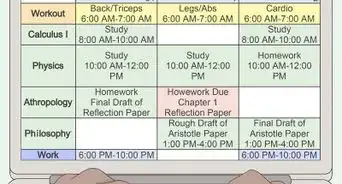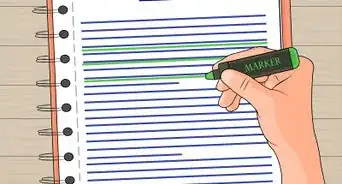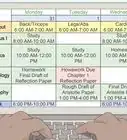This article was co-authored by Christopher Taylor, PhD. Christopher Taylor is an Adjunct Assistant Professor of English at Austin Community College in Texas. He received his PhD in English Literature and Medieval Studies from the University of Texas at Austin in 2014.
There are 9 references cited in this article, which can be found at the bottom of the page.
This article has been viewed 41,948 times.
Facing difficulties with homework you don’t understand can affect your grades, and prevent you from grasping certain subjects and moving on to the next course. There are several ways to go about completing homework you don’t understand, depending on your unique situation. Ask for help at school if you know you need it then, but if you only discover your confusion after getting home, you can still ask for help from others or utilize resources like your textbook or the internet. Putting healthy homework habits into practice can also help you earn as many points as possible on an assignment you don’t quite understand yet.
Steps
Getting Help at School
-
1Take notes at the time your homework is assigned. Most teachers explain homework instructions at the time the assignment is given. If the instructions are verbal, write them down in your notebook or planner as your teacher explains the assignment. If the instructions are written, listen for any additional instructions or hints your teacher may give and take notes on those.
- Review the homework assignment immediately, even if the dismissal bell is about to ring and you’re eager to leave. Ask your teacher for clarification if you don’t understand the details of the assignment.[1]
-
2Ask your teacher to write the instructions on the board. If your teacher talks too fast, or you feel distracted at the time he or she explains the homework, ask your teacher to write or post the instructions where you can see them. This allows you to gather information needed to understand the assignment at your own pace.
- In the short-term, this generally works best for assignments with easily summarized details--e.g., problems 1-35, odd numbers only, on page 82 in your textbook. For more complex assignments, you can ask your teacher to put the information on the board, but they may decline and offer to explain it to you after class instead.
- If you consistently have trouble copying down the details of your teacher’s assignments, consider approaching them after class one day, explaining your difficulty, and asking if your teacher would be willing to start writing the details of future assignments on the board so you can copy them down without feeling rushed or panicked.
Advertisement -
3Approach your teacher after class. Ask your teacher for clarification on homework instructions. If you don’t understand how to do your homework because the instructions aren’t fully clear, clarify the assignment instructions with your teacher or instructor after class ends.[2]
- If you’re worried about arriving late to your next class, you can usually ask your teacher to write and sign a note explaining your tardiness to your next period’s teacher. Alternatively, you can try approaching your teacher after school ends, but this can cause a problem if your teacher leaves early or if you need to catch a bus home.
- At most colleges and universities, and at some high schools, your instructors will generally have office hours posted in a syllabus or on an office door. During these hours, they’re usually available to help students with questions. You can try stopping by if you need quick clarification, but for more detailed questions, it might be better to schedule a specific time to meet.[3]
-
4Consult other teachers at your school who teach the same subject. If you don’t understand the homework because your teacher explained the assignment in a way that doesn’t make sense, ask other teachers if they can explain the assignment differently.[4]
- This often works best if you approach a teacher you already know, whether you know them from a previous year’s class or through an extracurricular activity. If you don’t know any other teachers, consider asking a friend in another class to introduce you to their teacher instead of approaching that teacher on your own.
- Don’t worry too much about hurting your teacher’s feelings or pride. A good teacher will want what’s best for their students. That being said, be sure to avoid insulting your teacher’s ability to teach when asking for help since that may hurt your long-term relationship with your instructor.
Getting Help from Others After School
-
1Ask for help from classmates. Your classmates are ideal sources for helping you understand your homework, especially those who already completed the assignment or excel in the subject. You can ask your classmates for clarification on the instructions or for help in understanding the material itself.
- Nowadays, it shouldn’t be too difficult to contact a few classmates through social media or texting. If you’re too young for social media accounts or your own phone, you can ask a parent to call one of your friends’ houses, instead.[5]
- For help with the instructions, you’ll usually need to ask someone in your class. For help with the material, however, you might also be able to ask friends in another class who are covering the same information at the same time; in fact, their teacher may have presented the information from a different perspective, allowing them to introduce that fresh perspective to you, too.
- For bigger assignments, you might even try organizing a study group for the homework assignment.[6]
-
2Look up university or school resources. Some institutions may offer a learning center or writing center where you can be tutored by teaching assistants or fellow students. Search your university or school's web page for more information.
- Some schools and universities offer special tutoring programs for athletes, first generation college students, or other groups.
- If you're uncertain where to find information, ask a librarian. They can often point you in the right direction.
- Don't forget to ask your professors, teachers, and classmates about where you can get additional help.
-
3Check with your siblings or school-aged relatives. If you aren’t able to get help from your classmates, older siblings and cousins can be your next best option, especially if they’re only older by a year or two. The information should still be somewhat fresh in their minds--they may even use the same principles in their current grade level assignments--so they might be able to answer any questions you have about the material.
- You might also consider asking relatives who are the same age as you. It’s possible that they’re covering the same material now, or that they’ve covered it a few weeks sooner than your class has.
-
4Ask for help from your parents. While the information may not be as fresh in their minds as it would be for a sibling or cousin, your parents will still know a lot, especially if you’re learning information they use regularly or learning about a subject they enjoy.
- You can ask other members of your extended family, too, such as aunts, uncles, and grandparents. Some individuals are better than others at certain subjects, and might be able to explain your homework and the subjects you’re studying in a way that helps you understand them better. For example, if you’re struggling with English, ask family members who love to read if they can help you understand your assignment.
-
5Consult a tutor. This option won’t be available to everyone, but if you have access to a private tutor or if your school has a tutoring center, you should definitely consider asking them for clarification on the homework material. They should be willing and able to help; after all, a tutor gets paid to help students.
- Send an email or call your tutor if you have a question but aren’t scheduled to meet with them the evening you have it.
- You can also ask your tutor if they have any advice on an assignment that isn’t related to the topic they tutor you for--e.g., you might ask your chemistry tutor for help on a math problem.
- The worst that can happen in either scenario is that your tutor will say they are unable to help you.
-
6Email your teacher. If your instructor has provided your class with an email address, and you’ve exhausted your other options, consider sending them an email asking for clarification. Try to be as specific as possible when explaining what part you don't understand, whether it deals with the instructions or the material itself, and ask direct questions that can clarify your confusion.[7]
- For instance, you might type, "I'm confused about which problem set I need to do. I thought you said the problems were on page 86 of the textbook, but there aren't any problems on that page."
- Understand that your teacher may not be able to respond right away. Even if they don't, you've at least communicated your desire to understand to your teacher, which may encourage them to spend more time on the material in future class sessions.
Helping Yourself
-
1Read your textbook. In many cases, homework assignments reflect what you’ve recently been learning in class. If you don’t understand the homework because you’re not familiar with its topic, review your class textbook to gain a better understanding.[8]
- This can be especially helpful when your teacher assigns problems from your textbook or from a related workbook, but even if the assignments come from a completely different source, you can still review your textbook chapter on the same topic for additional insight.
- Don't be afraid to do unassigned problems from your textbook, too. Some textbooks may have answers to even-numbered problems, for instance, in the back of the book; if your teacher assigns you the odd-numbered problems from the same chapter, do a few of the even-numbered ones and check your answers to increase your understanding of the material.[9]
- If you don’t understand the way your textbook explains things, you can also go to the library and look at their collection of textbooks on the same subject. One of those might present the material in a clearer way.
-
2Review past assignments and handouts. Many teachers will return assignments with corrections on them. If you have any related to the homework you’re currently working on, consult these past assignments and your teacher’s noted corrections, and try to figure out what your past mistakes were. Understanding where your processes have gone wrong in the past might help you figure out how to approach the current homework.
- On a similar note, many teachers also pass out handouts related to the class material. Keep these handouts and refer back to them while doing the assignment. They may contain helpful supplementary information that isn’t in the textbook or your notes.
-
3Use the Internet as a resource. If your textbooks and study materials aren’t providing you with the information you need to understand your homework, search for tips and guidance online about how to complete your assignment. For example, if your teacher assigned an essay about the subject, but you don’t know how to write essays, look for essay tutorials and sample essays that can help you get started.
- For math and science problems, you could also search for free online video tutorials about the subject.[10]
- For vocabulary, math problems, historical dates, and other related information, try typing the question directly into a search engine. An explanation of the material might pop up among the results.[11]
- For literature assignments, you can often find online study guides or discussion guides for the work.
- You may also look for a computational problem solver for math problems, or an online translator for foreign language problems. Just make sure you choose a resource that provides explanations so that you're understanding the material, instead of only getting the assignment done.[12]
-
4Play games that help you better understand your homework. Playing interactive games about topics you don’t understand can be a fun, effective way to enhance the learning experience. For example, if you’re struggling with understanding algebra homework, search online for websites that offer several free math games that can help you grasp algebraic equations.[13]
- You can find interactive games on a variety of topics--from language arts to biology and everything in between.
- This might work best during your grade school and middle school years. Once you start learning more advanced concepts in high school and post-secondary school, you’ll likely find fewer games dedicated to the subjects you’re studying.
Completing Confusing Assignments
-
1Work on homework as soon as possible. You should ideally work on any homework assignment the same day you get it, even if it isn't due until a week later. That way, you'll learn early on if you don't understand it, and you'll have more opportunity to get the help you need before the due date.[14]
- The same idea also applies to homework due the following day. Working on it during study hall lets you know if you’ll need clarification before you leave school. Working on it earlier in the evening, rather than right before bed, gives you the chance to contact friends, ask an older sibling or parent for help, or email your tutor or teacher.
-
2Minimize distractions. This is good advice for any homework you complete, but it's especially important when working on homework you don't understand. Turn off your phone, sit in a quiet area without noise from a TV or radio, and dedicate your full attention to your homework.[15]
- The exact location doesn't matter as long as it's relatively free of noise and tempting distractions. You'll need your full concentration when tackling difficult problems.
-
3Show your work. While this won’t be applicable to every homework assignment you get, for math problems and science problems, show your work instead of only showing your answers. You may get partial credit if part of the work is accurate, but even when that isn’t the case, your teacher can still highlight where your process went wrong and provide you with the precise information you’ll need to understand the same type of problem in the future.
- That said, you should still keep working at a problem until you think you’ve arrived at the right answer--or, at least, at an answer that could be correct.
- If you know something went wrong or know which part of the process you don’t understand, you could also consider writing a note for your teacher to that effect. For instance, you might draw an arrow pointing at a formula you don’t know how to use correctly, with a note saying, “I know something went wrong here, but I couldn’t figure out my mistake.”[16]
-
4Turn in your assignments. Always work on every piece of homework you get, and turn in every piece of homework, even if you didn’t fully understand it. Your teacher doesn’t expect your assignments to be perfect. They do, however, expect you to put effort into your education, and that means doing the work they assign to you.
- Also keep in mind that many ideas build on each other as you progress through the material, so if you fall behind on earlier assignments, you may not learn the material you need to understand future assignments.
-
5Review corrections when you get homework back. When you get homework back with corrections on it, redo the incorrect work following your instructor's advice. Ideally, keep going over the corrections until you can solve the problem accurately and understand your previous mistakes.[17]
- Even if your teacher doesn’t provide detailed instructions, reviewing your returned assignments will at least confirm which parts you were able to understand and which parts you’re still a little lost on. You can then approach your teacher, tutor, parents, or classmates with questions on those parts you still need help with.
Community Q&A
-
QuestionMy summer homework only has confusing examples, but no instructions. What should I do?
 Community AnswerAsk an adult for help. They may have a better understanding of what you are supposed to be doing. They may be able to find a copy of the teacher workbook, which would include instructions. They may also be able to contact your teacher to ask. Asking for help shows you are trying hard, even if you don't know how to do the work.
Community AnswerAsk an adult for help. They may have a better understanding of what you are supposed to be doing. They may be able to find a copy of the teacher workbook, which would include instructions. They may also be able to contact your teacher to ask. Asking for help shows you are trying hard, even if you don't know how to do the work. -
QuestionI am sick and I just got my homework, but I don't understand what it is about. Nobody is at home, so I can't ask an adult for help. What should I do?
 Community AnswerTry looking for YouTube videos to explain the topic. There is usually at least one, if not several videos for any topic out there. You could also email the teacher, or call a friend who is in the class.
Community AnswerTry looking for YouTube videos to explain the topic. There is usually at least one, if not several videos for any topic out there. You could also email the teacher, or call a friend who is in the class. -
QuestionMy homework is confusing, and I can't find answers online or from siblings, and I have no time to ask my teachers. I usually get all these questions wrong. What should I do?
 Olivia PothierCommunity AnswerExplain to your teacher the next day when you get to class that you had a hard time with the assignment. You could also email them about it. Meet with them during a free period to tell them what you are having trouble with, and what you need help with.
Olivia PothierCommunity AnswerExplain to your teacher the next day when you get to class that you had a hard time with the assignment. You could also email them about it. Meet with them during a free period to tell them what you are having trouble with, and what you need help with.
References
- ↑ http://writingcenter.unc.edu/handouts/understanding-assignments/
- ↑ http://writingcenter.unc.edu/handouts/understanding-assignments/
- ↑ http://www.math.union.edu/~dpvc/courses/advice/hw.html
- ↑ http://kidshealth.org/en/teens/homework.html?view=ptr
- ↑ http://www.philipcummings.com/helping-with-math-homework/
- ↑ http://www.usingenglish.com/articles/why-your-students-dont-do-their-homework.html
- ↑ http://www.philipcummings.com/helping-with-math-homework/
- ↑ http://www.superkids.com/aweb/pages/features/homework/
- ↑ http://www.math.union.edu/~dpvc/courses/advice/hw.html
- ↑ http://www.philipcummings.com/helping-with-math-homework/
- ↑ https://www.understood.org/en/school-learning/learning-at-home/homework-study-skills/how-to-help-kids-with-tricky-math-homework
- ↑ http://www.philipcummings.com/helping-with-math-homework/
- ↑ https://www.care.com/q/questions/25998/what-do-i-do-when-i-dont-understand-my-childs-home-1.html
- ↑ http://www.math.union.edu/~dpvc/courses/advice/hw.html
- ↑ http://www.parenting.com/article/help-kids-with-homework
- ↑ http://www.math.union.edu/~dpvc/courses/advice/hw.html
- ↑ http://www.math.union.edu/~dpvc/courses/advice/hw.html










































































